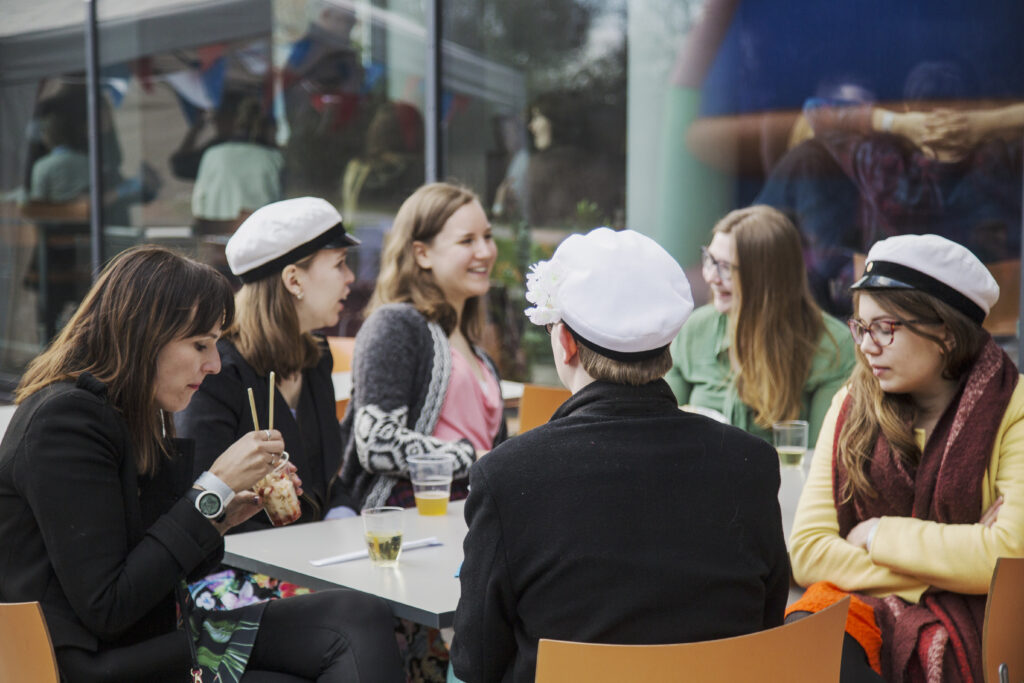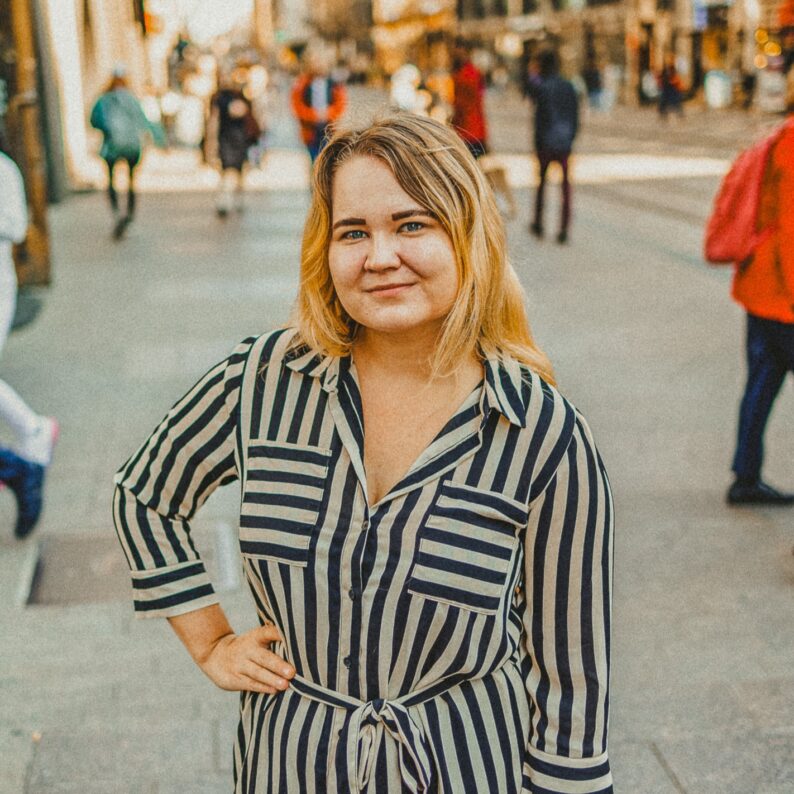


Experiences of serving as a student representative and the new student representatives!
Now that our new student representatives in administration are selected, we decided to ask some people who were previously involved in these matters how the skills they learned in their positions have helped them in working life. At the end of the article, you will also get to read presidential thoughts on the matter!
Juha Hurme
Who are you?
Protocol specialist, MA Juha Hurme, secretary of the University Collegium
Where have you served as a student representative?
As a student representative in the executive group of a department, a faculty council and the collegium as well as in several working groups and cooperation bodies including the University’s Academic Affairs Council and the Language Centre.
What kind of skills did you learn in the positions in question, and how have they helped you later in your career?
Administrative bodies at the faculty and university level in particular help you learn to grasp large issues and understand where money comes from and where it goes. Networking with professors and the middle group is also crucial. In teaching skills assessment committees, for instance, you got to see the full spectrum of teaching skills as well as influence the recruitment of teachers. As a student representative, you also learn to read extensive meeting documents in a cursory fashion and pay attention to the aspects that are relevant to decision-making. Later, I turned my hobby into a job, working first as HYY’s specialist in educational policy and then at the University in positions including the secretary of a teaching skills assessment committee and my current position, the secretary of the University Collegium.
Would you encourage current students to become student representatives?
I absolutely would encourage them to become student representatives. You cannot learn everything on lectures or from exam books. Next year, the University Collegium, for instance, will elect the chancellor, which means that now is a great opportunity to get to influence important matters.
Katri Korolainen
Who are you?
I’m Katri Korolainen, director of communications and relations at the Finnish Association for Children and Youth, with a MA in Finnish history. I studied at the University in 2004–2012 and was very actively involved at all levels of administration during that time.
Where have you served as a student representative?
In the departmental steering group of the Department of History in 2007–2010 and in the University Collegium during the same years. The Universities Act came into effect, and the University adopted a board model. The size of the collegium was reduced to around one third of its old size. I was the student group’s negotiator when the University Collegium appointed the University Board for the first time. We got to decide how the seats were allocated, who were included in the composition of the Board and how the whole process was realised.
At departmental level, I took part in several processes for filling permanent posts as well as in committees as a student representative. Decisions on the curricula were among those that I found both significant and meaningful to process.
What kind of skills did you learn in the positions in question, and how have they helped you later in your career?
Serving in the positions, I learned a lot about the University’s structure and work, which has been helpful in my work at the University. My understanding of administration and negotiation and process skills also improved, and those are useful in any job. When you work in public administration, you must know how the process works and how to achieve your goals, whether the issue deals with working groups or getting the tripartite principle with equal representation realised in the University Board. All these skills have helped me advance my career, especially as I’ve been involved in public administration and major administrative bodies. Matters get decided in meetings, but they are prepared elsewhere. You need to be in the right place at the right time and participate in the background discussions. Sometimes, you must also learn to compromise on certain things.
Would you encourage current students to become student representatives?
Most definitely! They were very important experiences for me. I also managed to expand my networks in the positions and now have friends and acquaintances working in different fields. People at the University are very well networked, which means that even though I no longer work at the University myself, I have still continued to be in contact with these people on business. In a way, it’s easy to form networks in your own field, but the administrative bodies also allow you to get acquainted with the people who wield the power in other faculties, across disciplinary boundaries – and these people are often involved in other societal development processes, too.
Katariina Styrman
Who are you?
I’m Katariina Styrman, YTN ry’s head of organizations (working with the negotiations of organisations operating under Akava), graduated with a MA in history in 2009.
Where have you served as a student representative?
As a tutor in a subject organisation, in a departmental steering group in the Department of History and as a vice member of a faculty council for around two terms. I was also in the collegium where I was involved in the process of appointing the rector and the chancellor.
What kind of skills did you learn in the positions in question, and how have they helped you later in your career?
These positions provide students with an amazing opportunity to learn how decisions are really made. This doesn’t only apply to the University but to all possible public instances. The process is the same everywhere: there’s preparation and presentation, you have to know how to act in meetings and make decisions correctly as well as what they mean. The most important things you need in working life are understanding how processes work and how you can influence them. When you have experience of how matters are prepared, you are also in a better position to ask what happened if the preparation is unsuccessful – this is something you only learn by doing. I’ve mostly been involved in strategic and operative development duties myself, and serving in the faculty council was good training for this.
If there are one hundred people with the same degree, employers will also look at what else the person has done, and any skills and experience of this kind is generally considered as an advantage, whether it comes from the organisational sector or state administration. On the other hand, I recommend viewing the positions more as interesting life experience than simply something you can benefit from – like a long-term investment of sorts. And serving on the faculty council was also fun at times! We had good cooperation with all personnel groups, and things progressed to a better direction than they would have by themselves. After I was first faced with the Universities Act, it took quite an effort to learn all about it. On the other hand, however, the position itself was largely about fact-finding and learning.
Would you encourage current students to become student representatives?
Absolutely! It’s a great opportunity to learn about things that you rarely get to work with during your studies and that will also be useful in the future. Of course, getting to advocate students’ interests is important in itself, but you don’t always realise that it’s useful for yourself as well. All in all, I think getting involved in administration is definitely worth it, and even if you find out that it’s not for you, at least you’d have the experience.
Tarja Halonen
Who are you?
Tarja Halonen, Chair of the Board of the University of Helsinki, president.
Did you serve in University administration during your studies?
I did not serve in University administration as such, but I had to finance my studies in the 60s with part-time work. I was actively involved in a student nation, as part of a faculty organisation and in some of the single-cause movements that emerged at that time. I was what you might call a base-level activist. I wanted to continue my participation in university circles.
I graduated with a Master of Laws degree in 1968 and got into the National Union of University Students in Finland. In the union, I worked first as a social policy secretary and later as an organisational secretary. Around this time, we were trying to get the ‘one man, one vote’ principle implemented. I was also on the Board of the Finnish Student Health Service as well as the director of the student home that the National Union of University Students in Finland had back then. My duties involved practical matters on several levels.
These perspectives are the ones from which I have observed the reform of the Universities Act and other activities.
How do you see the role of students in the University’s decision-making processes?
Extremely important! The ‘one man, one vote’ principle encapsulates the spirit of its times nicely, even though the principle was somewhat overambitious in relation to realistic possibilities, and it was thus not realised. On the other hand, when the university reform was done over a decade later, I was in the government. At that point, the fact that I remembered why the reform was opposed before and on what grounds proved helpful. The University administration is not only about participation or learning administrative matters. Later, I was able to use lessons I learned during this period in other professional decision-making processes.
It is very important to learn about various institutions by being involved in them yourself. Participation may have a long and, I believe, positive effect on your other professional and societal activity. This is also important for the University itself as well as its development.
Even today, I have higher education interns in my foundation. The interns receive a three-month crash course on what issues are in the public eye at a given time and what should be done about it – while I get a vitamin boost from them. This represents intergenerational cooperation of a kind, with the student learning to influence older generations while also learning about the long history of various issues.
What kind of skills do you think student representatives need and develop in the University’s decision-making processes?
They need to be active. You must have dreams and goals, but having previously served in some capacity in student organisations or students’ own organisations, possibly even outside the University, is also useful – this way, your overall view of things extends beyond your own feelings.
Being a student representative requires the ability to cooperate and make realistic compromises. No matter how good your own ideas are, they will not be approved in decision-making processes without any changes along the way. However, active student representatives who have initiative and listen to others are often capable of mutual interaction too.
Everything you have done before becoming a student representative, either in the University or in organisations outside it, may come in handy.
Would you encourage current students to become student representatives in administration?
Absolutely! There are student representatives on the Board of the University of Helsinki, but all other opportunities to influence matters are also important. It is good to see how one thing can lead to another in the long term.
I would also recommend that student members in different bodies at the University maintain contacts with one another. This would provide them with a clearer overall picture of whether certain measures only concern a single faculty or campus or whether the impact is more extensive.
Political experience is not necessary to become a student representative, but it may give you more opportunities for action. Contacts are already useful when applying, but you should get in touch with people from more than one current of opinion at least after becoming a student representative. International contacts are also good if you have them.
You cannot properly see all the way to the field – a community of 40,000 people – from our University’s administration. I recommend communicating with other people and having an open mind while doing so!
Vote and run as a candidate yourself. Don’t demand too much from yourself, and don’t underestimate others.
THE NEW STUDENT REPRESENTATIVES FOR TERM 1.1.2022-31.12.2023
FACULTY COUNCILS
X (actual member) & X (vice-member)
Faculty of Biological and Environmental Sciences
Amalia Hytti & vice-member will be named later
Rebekka Kukowski & vice-member will be named later
Lilli Rasila & vice-member will be named later
Elisa Sillifors & vice-member will be named later
Fifth actual member and their vice-member will be named later’
Faculty of Veterinary Medicine
Viivi Hilska & Iida Lilleberg
Milla Iso-Koivisto & Laura Itkonen
Riikka Kokko & vice-member will be named later
Faculty of Pharmacy
Kauri Laine & vice-member will be named later
Salla Lahdentausta & vice-member will be named later
Faculty of Arts
Miina Hentinen & Joona Jokilampi
Eveliina Weiderbacher & Emma Kantosalo
Kim Keskiivari & Axel Ojala
Sampsa Granström & Pia-Stina Repo
Miro Mestämuuronen & Anna Jarske-Fransas
Faculty of Educational Science
Petra Pulli & Paula Simola
Emma Mäenpää & Nina Strandén
Tommi Mäki & Akseli Hakkarainen
Konsta Lindi & Anni Kouhia
Elena Kantinkoski & Netta Jekkonen
Faculty of Medicine
Amanda Ahlmark & Salla Skön
Siiri Piha & Jyri Kallela
Linnea Hurri & Johanna Castrén
Richard Örn & Jalmari Stenberg
Anssi-Kalle Heikkinen & Ilari Heikkinen
Faculty of Agriculture and Forestry
Janina Lehtimäki & Helmi Rihko
Nuutti Pirhonen & Aleksi Sipilä
Sanna Elomaa & Helena Ikonen
Jari-Pekka Tamminen & vice-member will be named later
Aino Heiskanen & vice-member will be named later
Faculty of Science
Vili Järvinen & János Pap
Karolina Ambroziak-Murzyn & Tri Luu
Siiri Saloranta & Valtteri Kantanen
Heli Parviainen & Aleksi Suuronen
Ronja Öhrnberg & Taavi Heikkilä
Faculty of Law
Sofia Uusitalo & Sami Makkonen
Joar Cederberg & Ella Miikki
Riina Rönkkö & Eero Roslander
Saara Palo & Jere Mattila
Kim Hakala & Jaakko Tiinanen
Faculty of Theology
Jori Vismanen & Laura Oikarinen
Marketta Kiiveri & vice-member will be named later
Janne Salokoski & vice-member will be named later
Faculty of Social Sciences
Joanna Ahola & Marie Lindqvist
Merja Kiiskinen & Lauri Kauppila
Teemu Kovanen & Nora Pihlajaniemi
Henrik Peiponen & Reeta Palomäki
Sini Tahvonen & Matias Kivipuro
UNIVERSITY COLLEGIUM
X (actual member) & X (vice-member)
Faculty of Biological and Environmental Sciences
Eugenie van der Meulen & vice-member will be named later
Faculty of Veterinary Medicine
Riikka Kokko & vice-member will be named later
Faculty of Pharmacy
Aukusti Alanko & Salla Lahdentausta
Faculty of Arts
Aleksi Tujunen & Axel Ojala
Sampsa Granström & Kim Keskiivari
Faculty of Educational Sciences
Lovisa Hirvonen & Juha Saarikoski
Faculty of Medicine
Fredrik Lagerstam & Benjamin Bergan
Faculty of Agriculture and Forestry
Vilppu Tuominen & Onni Nyman
Faculty of Science
Taavi Heikkilä & Ronja Öhrnberg
Jessika Isomeri & Niclas Forsman
Faculty of Law
Saara Palo & Sami Hasunen
Swedish School of Social Science
Tuukka Kainulainen & Isabella Ollus
Faculty of Theology
Jori Vismanen & vice-member will be named later
Faculty of Social Sciences
Aku Houttu & Joona Rissanen
Akseli Rouvari & Antti Kivi



